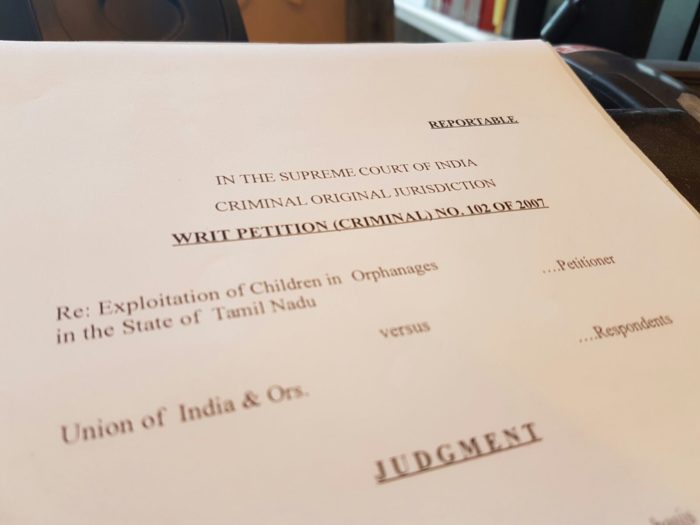Supreme Court of India: count all children and ‘seriously consider’ alternatives to orphanages

On 5 May 2017, the Supreme Court of India issued significant directives to governments in India in the case of Re: Exploitation of Children in Orphanages in the State of Tamil Nadu v. Union of India & Ors. The decade-old case highlighted a number of all too familiar and disturbing trends — sexual abuse and exploitation of children and the lack of proper documentation and available data on children living in residential care institutions , among others.
The case, registered as public interest litigation in 2007, made its way to the courts on the basis of a letter and 2007 article alleging systematic sexual abuse of children in NGO and state-run institutions in Mahabalipuram (Tamil Nadu), including allegations of foreign and Indian tourists receiving sexual services from children either over the telephone or at orphanages and of the sexual abuse of girls in schools, among others.
A decade without progress
From January 2013 onward, a number of orders were issued by the Court to expand the scope of the case to address children’s rights generally, ensure that the provisions for the protection of children were implemented, and to obtain information regarding efforts made by respective governments.
Despite its orders, the Court found that little or no progress was made by States and Union Territories, observing the “lackadaisical manner in which the States and the Union Territories had responded to the rights of children”. It further noted the lack of empathy and “complete apathy with respect to the disturbingly increasing instances of child sexual abuse” and ineffective implementation of the laws, virtually rendering parliamentary legislation irrelevant.
Ms. Aparna Bhat was appointed as an amicus curiae (friend of the court) and provided information to the Court on three issues: (i) children in need of care and protection; (ii) trafficked children; and (iii) children living in street situations. The Court, however, did not consider the latter two issues, leaving the matters for “consideration in an appropriate case”.
Government to Prepare Database of Children in Orphanages
The Court observed that the registration process of residential care institutions in India was incomplete despite the adoption of the Juvenile Justice Act which mandated the registration of all institutions by 15 July 2016. The Court opined that “[i]f the registration of child care institutions is not complete, their management obviously cannot be supervised”. The Court went on to stress that it failed to appreciate why full registration has yet to be completed “[i]n this day and age when high quality technology is available and there is no shortage of manpower”.
The Supreme Court directed States and Union Territories to register residential child care institutions by the end of the year, noting that the registration process should also include the establishment of a database of all children in need of care and protection. The Court noted that such this should include the recording of the residential capacity and purpose of the child care institution.
Alternatives to Institutionalisation
The Court also took notice of submissions that the institutionalization of children is not necessarily the only available option and directed that alternatives to institutionalization such as foster care and adoption be “seriously considered”. To that end, the Court requested the juvenile justice committee to consider establishing a secretariat for assistance.
The Court further directed States and Union Territories to, among other things, set up inspections of institutions, prepare individual child care plans for all children in care, implement rehabilitation and social re-integration schemes for children leaving care, ensure the training of personnel involved, and conduct social audits.
Stahili welcomes this decision of the Supreme Court of India. It is high time that children are protected and counted, and that States and Union Territories take concrete steps to promote family and community-based care as viable alternatives to the residential institutions that too many children in India have to call home. Children do best in families, not orphanages.